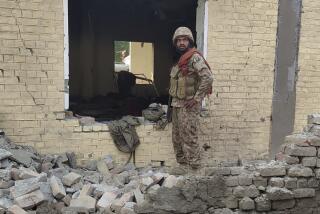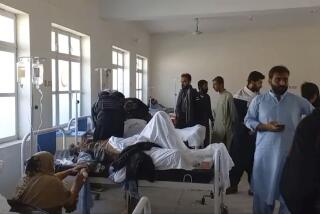38 Pakistanis die in suicide blast
- Share via
PESHAWAR, PAKISTAN — A suicide bomber killed at least 38 people and wounded scores Friday at a police officer’s funeral in the country’s troubled northwest, officials said.
The attack in the scenic Swat valley was a graphic reminder of the rising Islamic insurgency confronting the country’s new leadership. Opposition parties won the Feb. 18 elections and are in the process of forming a government.
The Swat valley, about 100 miles from the capital, Islamabad, has for months been the center of a battle between militants and government troops.
The government has repeatedly claimed to have subdued the fighters loyal to radical cleric Maulana Qazi Fazlullah, but attacks continue. Last week, more than a dozen people were killed in a bombing.
Friday’s attack in Mingora, the district capital, was at the funeral of a high-ranking police officer, Javed Iqbal, killed in a roadside bombing earlier in the day in another region.
Hundreds had gathered for the service at a high school, including district officials and members of the security forces.
The powerful blast, which came at dusk, sparked chaos and panic amid the closely packed crowd, witnesses said. Officials said the near darkness allowed the assailant to mingle easily with the mourners.
Police put the number of wounded at more than 60.
An overnight curfew was swiftly imposed, which prevented some people from going to hospitals to donate blood. A reliable casualty count was difficult to obtain because some people took relatives’ bodies home to prepare for burial.
District police officer Wafiq Khan said some of the wounded were in critical condition, and the death toll could rise.
The fighting in Swat, which broke out late last year, was seen as an ominous sign that militant groups were pushing outward from the lawless tribal areas along the border with Afghanistan. Swat lies in the “settled” area that is, in theory if not in practice, under the writ of the central government.
President Pervez Musharraf declared months ago that troops had “broken the back” of the insurgency. But Fazlullah remains at large, and some of his fighters are thought to have returned.
It is not yet known how forcefully the new government, to be led by the party of slain former Prime Minister Benazir Bhutto, will move against Islamic militants.
The party’s head, Bhutto’s husband Asif Ali Zardari, has blamed extremists for his wife’s death and vowed to confront them. But he has also said he believed that elements within the government were complicit in her killing, and has not publicly endorsed the government’s alliance with the U.S. in the fight against the militants.
--
--
Special correspondent Ali reported from Peshawar and Times staff writer King from Istanbul, Turkey.
More to Read
Sign up for Essential California
The most important California stories and recommendations in your inbox every morning.
You may occasionally receive promotional content from the Los Angeles Times.













